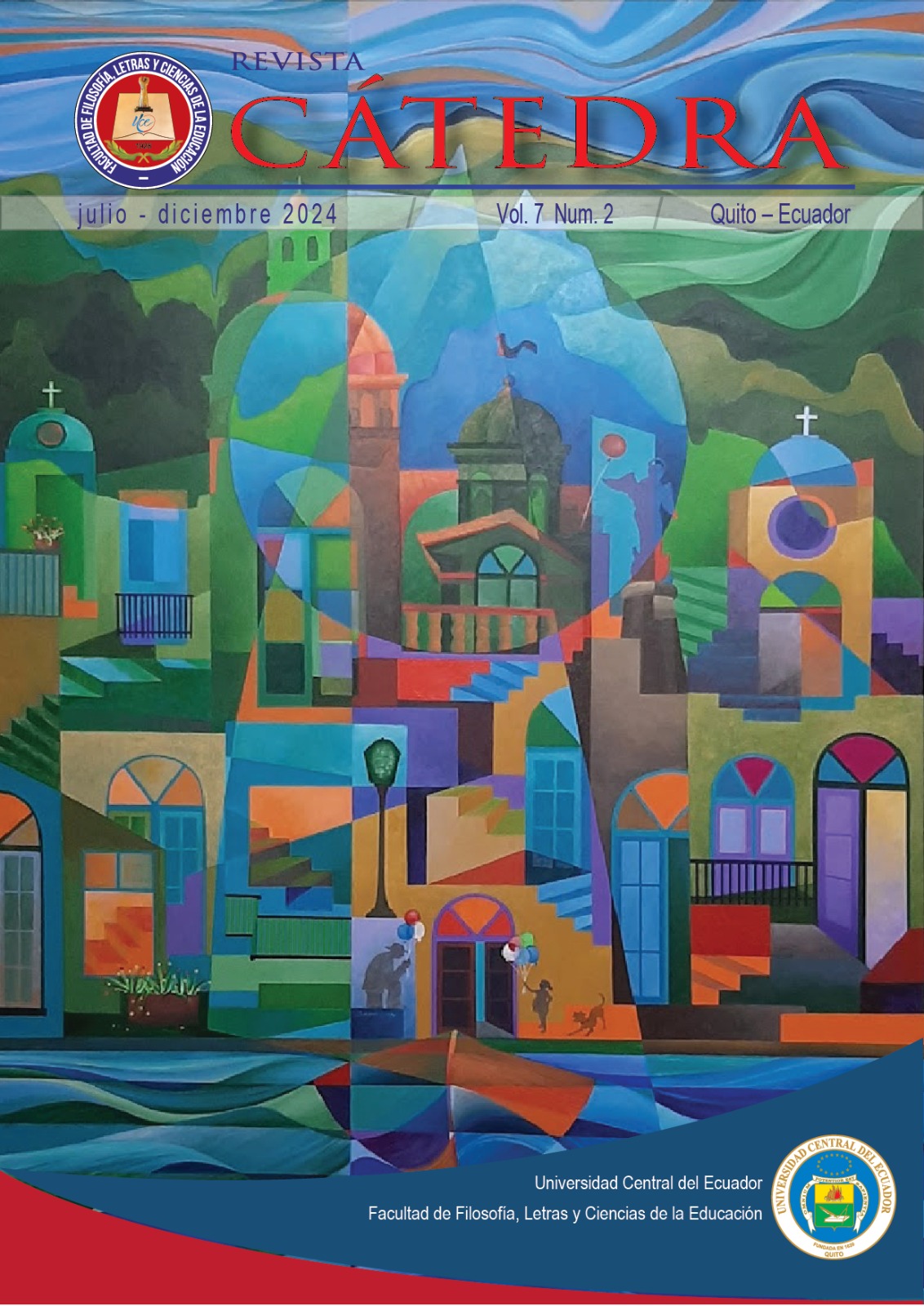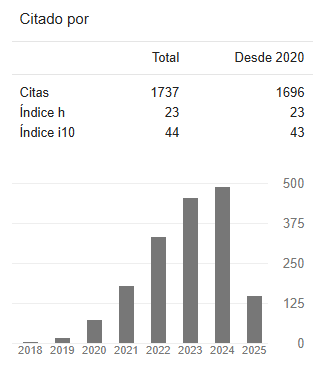The knowledge of learning strategies as an alternative for the strengthening of heutagogical competences in university students in virtual mode
DOI:
https://doi.org/10.29166/catedra.v7i2.6182Keywords:
learning, autonomy, virtual education, strategies, heutagogy, metacognitionAbstract
The article analyses the importance of knowledge of learning strategies to develop heutagogical competences in virtual university students. The manuscript raises as a fundamental problem the lack of development of heutagogical competences or the necessary skills and abilities that allow university students to learn in an autonomous and self-directed way. In response to this problem, the author proposes a number of strategies such as problem-based learning, collaborative learning and the use of technology to foster autonomous and self-directed learning. She theorises some questions about the philosophical, sociological, psychological, and pedagogical foundations of learning strategies; she makes a conceptual approach to heutagogy, its characteristics, principles and history. It examines the pillars of education as the main reference for understanding the formulation of learning strategies with a view to achieving an integral education of the human being. It is research with a qualitative exploratory approach that is supported by theoretical level methods such as the analytical-synthetic method and the inductive-deductive method and empirical level methods such as the direct experience of the researcher, content analysis, documentary analysis and literature review. Relevant findings include the need to propose various intentional, autonomous, metacognitive, contextualised, active and duly evaluated learning strategies to support the development of heutagogical competences, contribute with mechanisms for the adaptation of students to social changes, promote self-learning, enhance the sense of commitment and internal motivation, and, ultimately, promote the development of critical-creative-propositive thinking.
Downloads
References
Aguilar, F. (2010). Percepción y metacognición en la educación una mirada desde América Latina. Sophia: Colección de Filosofía de La Educación, 8, 147–196. https://doi.org/https://doi.org/10.17163/soph.n8.2010.06 DOI: https://doi.org/10.17163/soph.n8.2010.06
Aguilar, F. (2008). Estructura, relaciones, límites y perspectivas de ética y educación. Sophia: Colección de Filosofía de la Educación, 5, 39-78, https://doi.org/10.17163/soph.n5.2008.02 DOI: https://doi.org/10.17163/soph.n5.2008.02
Aguilar, F. (2017). Estrategias didácticas para desarrollar operaciones mentales en el sujeto que aprende. Tópos, Para Un Debate de Lo Educativo, 9, 45–54, http://repositorio.cfe.edu.uy/handle/123456789/826
Blaschke, L. M. (2016). Heutagogy and Lifelong Learning: A Review of Heutagogical Practice and Self-Determined Learning. The International Review of Research in Open and Distributed Learning, 13(1), 56–71. https://doi.org/https://doi.org/10.19173/irrodl.v13i1.1076 DOI: https://doi.org/10.19173/irrodl.v13i1.1076
Blaschke, L. M., & Marín, V. I. (2020). Applications of heutagogy in the educational use of e-portfolios. Revista de Educación a Distancia, 20(64), 1–21. https://doi.org/10.6018/RED.407831 DOI: https://doi.org/10.6018/red.407831
Delors, J. (1997). La educación encierra un tesoro: informe a la UNESCO de la Comisión Internacional sobre la educación para el siglo XXI. In Educación y cultura para el nuevo milenio. EDICIONES UNESCO, https://unesdoc.unesco.org/ark:/48223/pf0000109590_spa
Dieck, W. (2020). Six Principles of Andragogy – Malcolm Knowles. Brilliant Learning Systems, recuperado de: http://brilliantlearningsystems.com/six-principles-of-andragogy-malcolm-knowles/
Hase, S., & Kenyon, C. (2007). Heutagogy: A Child of Complexity Theory. Complicity: An International Journal of Complexity and Education, 4(1), 111–125. https://doi.org/10.29173/cmplct8766 DOI: https://doi.org/10.29173/cmplct8766
León, C. P. (2023). El autoaprendizaje en la educación médica. Spirat, Revista de Docencia y Gestión Universitaria, 1(1), 69–70. https://doi.org/10.20453/spirat.v1i1.4316 DOI: https://doi.org/10.20453/spirat.v1i1.4316
Martín, E. (2008). Aprender a aprender: clave para el aprendizaje a lo largo de la vida. CEE Participación Educativa, 9, 72–78.
Mcleod, S. (2023). Carl Rogers Humanistic Theory And Contribution To Psychology. Simply Psychology. https://www.simplypsychology.org/carl-rogers.html
Mendo, N., Vallejo, G., Sancho, I., Traba, N., Vallejo, I., & Álvarez, E. (2019). Caracterización del autoaprendizaje en estudiantes de reciente ingreso a la educación médica superior. Edumecentro, 11(4), 53–63, http://scielo.sld.cu/scielo.php?script=sci_arttext&pid=S2077-28742019000400053&lng=es&nrm=iso&tlng=es%0Ahttp://scielo.sld.cu/scielo.php?script=sci_abstract&pid=S2077-28742019000400053&lng=es&nrm=iso&tlng=es
Monereo, C., Castelló, M., Clarina, M., Palma, M., y Pérez, M. (1999). Estrategias de enseñanza y aprendizaje. Formación del profesorado y aplicación en la escuela (Sexta edic). Editorial Graó, http://uiap.dgenp.unam.mx/apoyo_pedagogico/proforni/antologias/ESTRATEGIAS DE ENSENANZA Y APRENDIZAJE DE MONEREO.pdf
Montessori, D. (2021). Maria Montessori Theory. Daily Montessor, https://www.dailymontessori.com/montessori-theory/
Morales, F. E., & Amaya, R. (2019). Educación universitaria y formación permanente desde una perspectiva heutagógica y aneregógica. Dialnet, 29, 554–569 https://dialnet.unirioja.es/servlet/articulo?codigo=7493443&orden=0&info=link
Palomino, M. (2018). Fundamentos filosóficos y técnicas metodológicas en el aprendizaje heutagógico. Universidad San Pedro - Perú, https://core.ac.uk/download/pdf/231106531.pdf
Silvain, G. L., & Díaz, E. C. (2018). Heutagogía y Andragogía : encuentro de enfoques de aprendizaje para la educación superior. Educación Superior y Universitaria En El NOA, 1–5.
Valle, A., González Cabanach, R., Cuevas González, L., & Fernández Suárez, A. (1998). Las estrategias de aprendizaje: características básicas y su relevancia en el contexto escolar. Revista de Psicodidáctica, 6, 53–68, https://www.redalyc.org/pdf/175/17514484006.pdf









